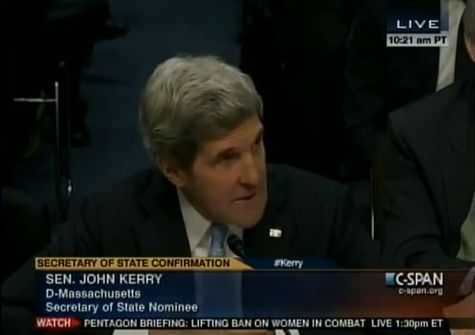![]()
RubinReports | By Barry Rubin

Sen. Rand Paul grills Sen. John Kerry about President Morsi’s anti-Semitic remarks during his confirmation hearing, jan 24, 2013. (image grab/youtube)
During his confirmation hearings, Secretary of State-designate John Kerry was only given a tough time by one questioner, Senator Rand Paul. The exchange between them is really interesting not just because of the specific topic but also because of what it shows about basic foreign policy philosophy, and ignorance, on Kerry’s part.
It is a genuine problem. The leader of a “friendly” (?) nation has been exposed for making antisemitic remarks. The United States wants to continue aid to avoid instability in that country that would contribute to even further radicalization, and to use U.S. leverage to produce the best possible outcome.
Unfortunately, Kerry subscribes — as is so fashionable today in the Obama Administration and academia — to what I’ll call the abusive relationship approach to foreign policy. If another country supports you and is good for your interests, you take it for granted and mistreat it; but if another regime — say, Turkey, Pakistan, Venezuela, Egypt, and at times in the recent past Syria and Iran come to mind — walks all over you then you chase after it all the more passionately and shower it with presents.
In the hands of a good realpolitik statesman, this balance would be managed well. For example, former Secretary of State Henry Kissinger would have kept the Egyptian government off-balance and made it understand that Washington was doing it a favor by providing aid. In other words, leverage would be used.
But in Kerry’s hands, leverage is tossed away. He is so afraid of using power or being tough that he throws away leverage, believing there can be no risk of problems. The recipient must not be intimidated or pressed to change but shown that America is its friend and not the imperialist bully that people like Kerry and President Barack Obama see when they look back at U.S. history.
Precisely the same problem was displayed notably in two other recent cases (though readers can probably add more):
- When the Palestinian Authority (PA) approached the UN seeking membership and recognition as a state, the Bush Administration made it clear to the UN and allies that there would be a strong price to pay in U.S. support and donations. The PA backed down. With Obama opposing the same thing but not playing any trump cards, America’s “friends” almost unanimously voted against Washington’s position and it suffered a serious loss whose costs (including the permanent destruction of the “peace process”) have not yet been counted.
- When it was suggested to Kerry that U.S. aid to Pakistan be held up until it released a political prisoner, a doctor who helped America locate Usama bin Ladin and who is now in prison and reportedly has been tortured, Kerry refused.
America must be the one humiliated; the feelings of other countries cannot be hurt.

Sen. Rand Paul to Secretary of State nominee John Kerry: “You’ve heard President Morsi’s comments about Zionists and Israelis being bloodsuckers…and descendants of apes and pigs, you think it’s wise to send them F-16s and Abrams tanks?” (image grab/youtube)
Rand Paul: “Do you think it’s wise to send [Egypt] F-16s and Abrams tanks?”
Kerry: “I think those [antisemitic] comments are reprehensible, and those comments set back the possibilities of working toward issues of mutual interest. They are degrading comments, unacceptable by anybody’s standard, and I think they have to appropriately be apologized for….”
Kerry, of course, isn’t answering the question. He is detaching the remarks from Muslim Brotherhood ideology and from U.S. policy. This is meaningless rhetoric on his part. It does, however, raise the intriguing problem of what Kerry would do since President Mursi isn’t going to apologize. That would have been a good question. Of course, he would do nothing.
Rand Paul [cutting Kerry off]: “If we keep sending them weapons, it’s not gonna change their behavior.”
Here is the essential question and the one that Kerry doesn’t want to answer. What reason is there to believe that the U.S. supply of arms would change the Brotherhood government’s policies? Rather than moderate its policy wouldn’t these arms merely enable the regime to follow a more radical position, and who would these arms be used against?
Kerry: “Let me finish. President Mursi has issued two statements to clarify those comments, and we had a group of senators who met with him just the other day who spent a good part of their conversation in a relatively heated discussion with him about it….”
Yes, Mursi issued two statements but they were not to take back his prior words but only to double down on them since he asserted that the statements had been taken out of context by the Zionist-controlled media. The man isn’t misspeaking. He’s just saying what he believes. Kerry and Obama refuse to recognize that he believes these things.
Lucky for them, they didn’t have to answer to Mursi’s and his colleagues’ anti-American statements. I can’t figure out why more use hasn’t been made of the strongly anti-American statements (including support for terrorist attacks on Americans and rejoicing about the alleged downfall of the United States due to Obama’s leadership) repeatedly made by Brotherhood leaders.
Kerry [continuing]: “We have critical interests with Egypt. Critical interests. Egypt has thus far supported and lives by the peace agreement with Israel, and has taken steps to start to deal with the problem of security in the Sinai. Those are vital to us, and to our national interests, and to the security of Israel….”
Yes, the United States does have critical interests with Egypt. Yet how can these interests be best maintained? Remember that Kerry previously insisted that the critical interests the United States had with Syria could be best maintained by rewarding the anti-American dictatorship there of President Bashar al-Assad.
Has Egypt so far supported and lived by the peace agreement with Israel, etc.? Well, technically yes though in a real sense the Egyptian government has not yet begun to govern in its full framework. For example, parliament has not convened yet. Moreover, the government has only acted cosmetically to deal with the security problem in the Sinai, reportedly making a deal with the Salafist terrorists to leave them alone if they cooled it for a while.
What Kerry suggests, but doesn’t prove, is that U.S. interests are best maintained by not criticizing or pressuring Egypt’s government. The only alternative to Obama policy is not breaking with Egypt but using traditional diplomatic methods to get what the United States should want.
Kerry: “The fact that sometimes other countries elect someone that you don’t completely agree with doesn’t give us permission to walk away from their election….”
Wow. This is truly ignorant. Just because Egyptians — or anyone else — elected a government does not mean that U.S. policy must accept whatever that government does. Yet I think Kerry and Obama actually believe that it does mean that. Moreover, the Brotherhood didn’t just win but had U.S. backing. It was the party Obama favored. And now, of course, the regime has killed dozens of Egyptians in anti-government riots. It has also jammed through an ultimately anti-democratic constitution. The money and weapons the United States gives the Brotherhood government will help it consolidate power, buy off dissent and be able to repress the population. Is that what U.S. interests require, the consolidation of an Islamist regime in Egypt?
Rand Paul: “This has been our problem with our foreign policy for decades — Republican and Democrat. We funded bin Laden, we funded the [Afghan] Muhjahideen. We were in favor of radical jihad because they were the enemy of our enemy. We’ve done this so often. I see these weapons coming back to threaten Israel… Why not just not give weapons to Israel’s enemies [to try and prevent a potential arms race]. That might save us a lot of money and might make it safer for Israel.”
Senator Paul is not exactly right here. It is not true — in fact it is an anti-American slander — to say that the United States funded bin Ladin. It did support Afghan Islamist forces but has not backed other Islamist revolutionary groups to any serious extent in the last four decades or so. What Obama is doing is largely unprecedented.
He also missed an opportunity to point out that arms were sold to some countries precisely because they had made peace with Israel and other countries because they supported U.S. policy generally despite being very anti-Israel. Arms were not given, however, to countries led by anti-American revolutionary Islamist groups that also openly declared their support for genocide of Israel and all Jews generally.
Kerry: “Better yet, until we are at that moment, where that might be achievable, maybe it’d be better to try and make peace.”
Wow, again. This is the mentality that has repeatedly crippled U.S. Middle East policy. It goes like this:
- We want peace.
- Therefore, we should not evaluate what policies are most likely to succeed but merely those that can allow us to say that peace remains possible. For example, even if the PA rejects talks for four years, we shouldn’t criticize or pressure it because that might make peace less likely, etc.
- It might work so we can’t “give up” but we must “keep trying” even though this period is not conducive to progress and even while other U.S. policies (especially backing toward Islamists) actually makes peace even more impossible to achieve.
Two final points. First, in Kerry’s worldview the more extremist a state becomes, the more it is necessary to propitiate it so as to avoid losing influence or the “chance for peace.”
In addition, he should be capable of making a sophisticated argument about precisely how America being tolerant of Mursi’s behavior and providing advanced weapons is going to advance American interests. The unspoken theory is that it will make the Egyptian military happy and able to overturn the regime.
But, of course, the regime will name the army’s commanders, the armed forces have shown they don’t want to get involved in politics, and at any rate many officers are pro-Brotherhood or even pro-Salafist. In other words, in Egypt (as in Pakistan by the way) there is no credible mechanism for turning financial or military aid into influence.
Kerry isn’t just wrong, he’s totally clueless. And as just about the most openly arrogant man in American public life he will never let reality penetrate through his ideological armor.
Barry Rubin is director of the Global Research in International Affairs (GLORIA) Center and editor of the Middle East Review of International Affairs (MERIA) Journal. His latest book, “Israel: An Introduction“, has just been published by Yale University Press. Other recent books include “The Israel-Arab Reader” (seventh edition), “The Long War for Freedom: The Arab Struggle for Democracy in the Middle East” (Wiley), and “The Truth About Syria” (Palgrave-Macmillan). The website of the GLORIA Center and of his blog, Rubin Reports. His original articles are published at PJMedia.



 RSS
RSS










Latest Comments
Hello Mike, Thank you for your positive feedback to the article. I felt there wasn’t too much critical analysis of ...
Thanks for this considered and well constructed article. A follow up article on the manner in which the editorial contro...
THE CLUELESSNESS OF CLAIMING THAT OBAMA'S MIDDLE EAST POLICIES WERE A FAILURE CANNOT BE FURTHER FROM THE TRUTH, WHAT THE...
As long as Obama is the president of the usa do not trust the us government......
Thank you for an good read....